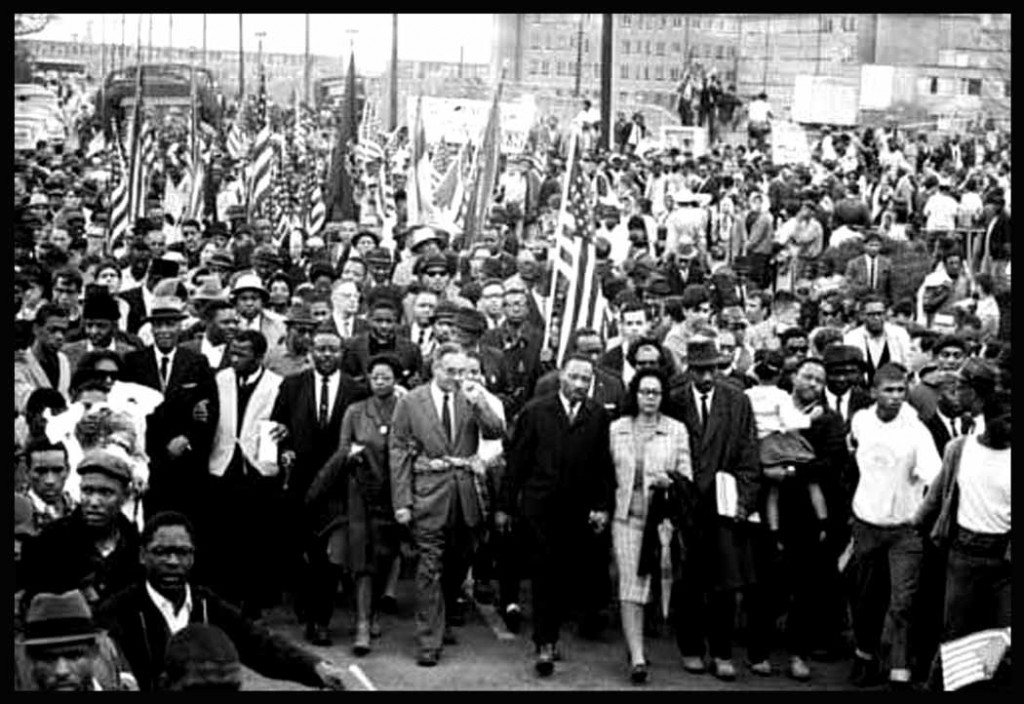 Dr.Martin Luther King called Bloody Sunday “the greatest confrontation so far in the South”
Dr.Martin Luther King called Bloody Sunday “the greatest confrontation so far in the South”
Selma March 50 Years Later
Saturday, March 7, 2015
Saturday marked the 50th anniversary of Bloody Sunday, when peaceful civil rights protesters marched across the Edmund Pettus bridge in Selma, Ala. only to be brutally beaten by police on the other side. The Obama family, along with members of Congress and civil rights leaders, made a symbolic walk across the bridge (Times Sat 3.7.15)
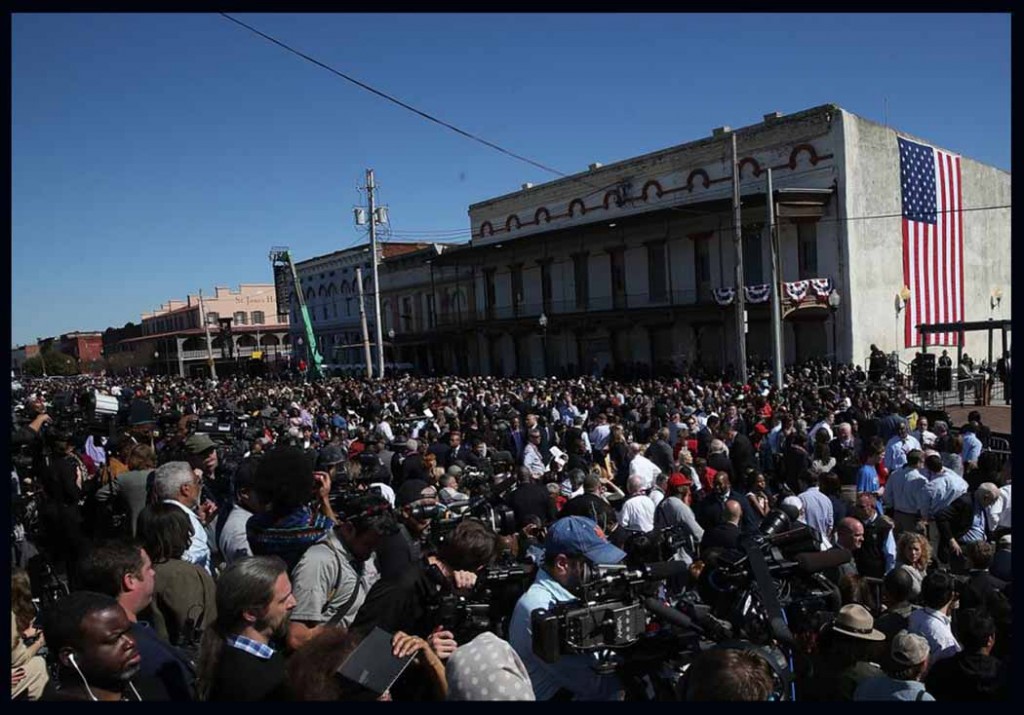 President Obama spoke before thousands on Saturday during a commemorative ceremony for the 50th anniversary of the events of “Bloody Sunday” when over 600 non-violent protesters were attacked by Alabama state troopers as they attempted to march from Selma to Montgomery for voting rights.
President Obama spoke before thousands on Saturday during a commemorative ceremony for the 50th anniversary of the events of “Bloody Sunday” when over 600 non-violent protesters were attacked by Alabama state troopers as they attempted to march from Selma to Montgomery for voting rights.
Here is the full text of Saturday’s speech, as prepared for delivery
https://time.com/3736357/barack-obama-selma-speech-transcript/
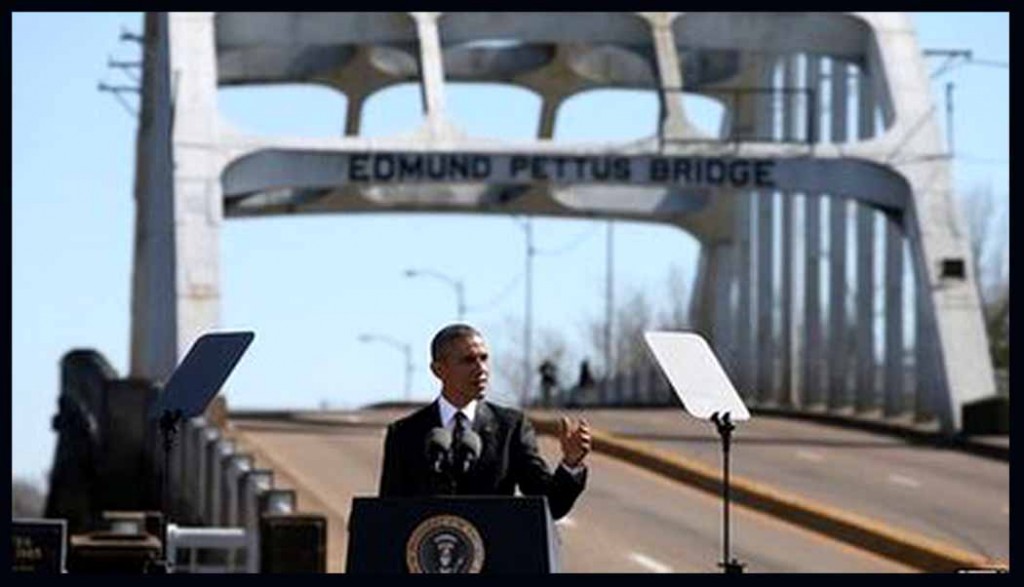 President Barack Obama speaks in front of the Edmund Pettus Bridge in Selma, Ala. on March 7, 2015. Justin Sullivan/Getty Images
President Barack Obama speaks in front of the Edmund Pettus Bridge in Selma, Ala. on March 7, 2015. Justin Sullivan/Getty Images
President Barack Obama’s Speech:
It is a rare honor in this life to follow one of your heroes. And John Lewis is one of my heroes.
Now, I have to imagine that when a younger John Lewis woke up that morning fifty years ago and made his way to Brown Chapel, heroics were not on his mind. A day like this was not on his mind. Young folks with bedrolls and backpacks were milling about. Veterans of the movement trained newcomers in the tactics of non-violence; the right way to protect yourself when attacked. A doctor described what tear gas does to the body, while marchers scribbled down instructions for contacting their loved ones. The air was thick with doubt, anticipation, and fear. They comforted themselves with the final verse of the final hymn they sung:
No matter what may be the test, God will take care of you;
Lean, weary one, upon His breast, God will take care of you.
Then, his knapsack stocked with an apple, a toothbrush, a book on government – all you need for a night behind bars – John Lewis led them out of the church on a mission to change America.
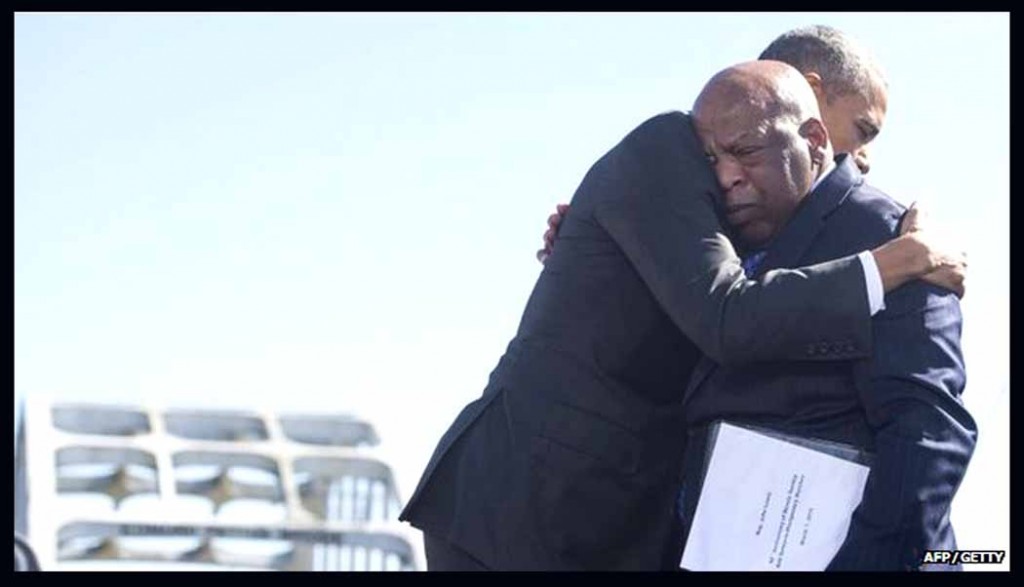 President Barack Obama hugged his fellow speaker congressman John Lewis, who was injured at Selma 50 years ago, on Saturday, March 7, 2015
President Barack Obama hugged his fellow speaker congressman John Lewis, who was injured at Selma 50 years ago, on Saturday, March 7, 2015
President Barack Obama’s Speech
President Bush and Mrs. Bush, Governor Bentley, Members of Congress, Mayor Evans, Reverend Strong, friends and fellow Americans:
There are places, and moments in America where this nation’s destiny has been decided. Many are sites of war – Concord and Lexington, Appomattox and Gettysburg. Others are sites that symbolize the daring of America’s character – Independence Hall and Seneca Falls, Kitty Hawk and Cape Canaveral.
Selma is such a place.
In one afternoon fifty years ago, so much of our turbulent history – the stain of slavery and anguish of civil war; the yoke of segregation and tyranny of Jim Crow; the death of four little girls in Birmingham, and the dream of a Baptist preacher – met on this bridge.
It was not a clash of armies, but a clash of wills; a contest to determine the meaning of America.
And because of men and women like John Lewis, Joseph Lowery, Hosea Williams, Amelia Boynton, Diane Nash, Ralph Abernathy, C.T. Vivian, Andrew Young, Fred Shuttlesworth, Dr. King, and so many more, the idea of a just America, a fair America, an inclusive America, a generous America – that idea ultimately triumphed.
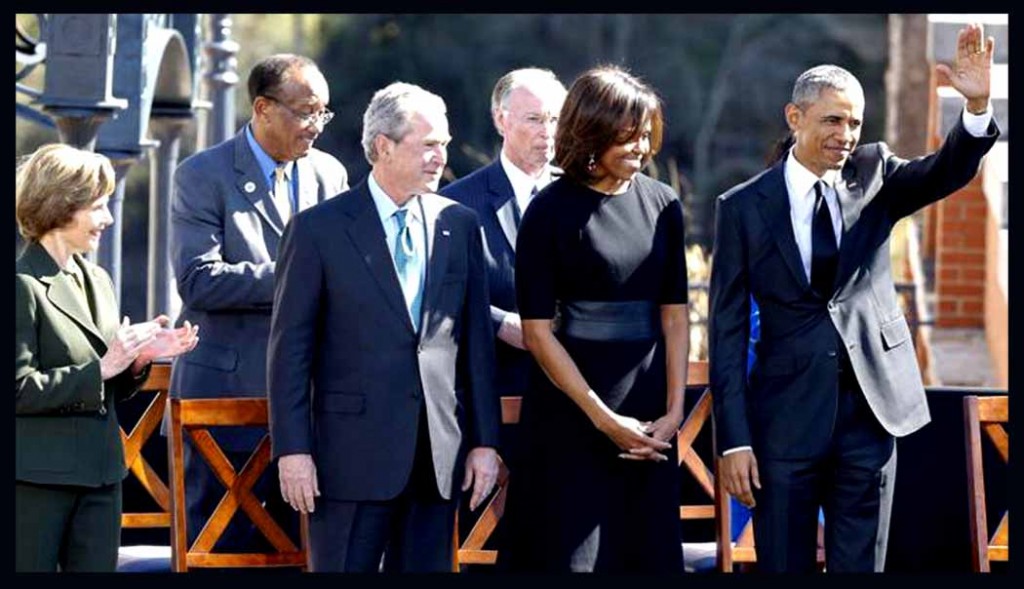 President Barack Obama’s Speech
President Barack Obama’s Speech
As is true across the landscape of American history, we cannot examine this moment in isolation. The march on Selma was part of a broader campaign that spanned generations; the leaders that day part of a long line of heroes.
We gather here to celebrate them. We gather here to honor the courage of ordinary Americans willing to endure billy clubs and the chastening rod; tear gas and the trampling hoof; men and women who despite the gush of blood and splintered bone would stay true to their North Star and keep marching toward justice.
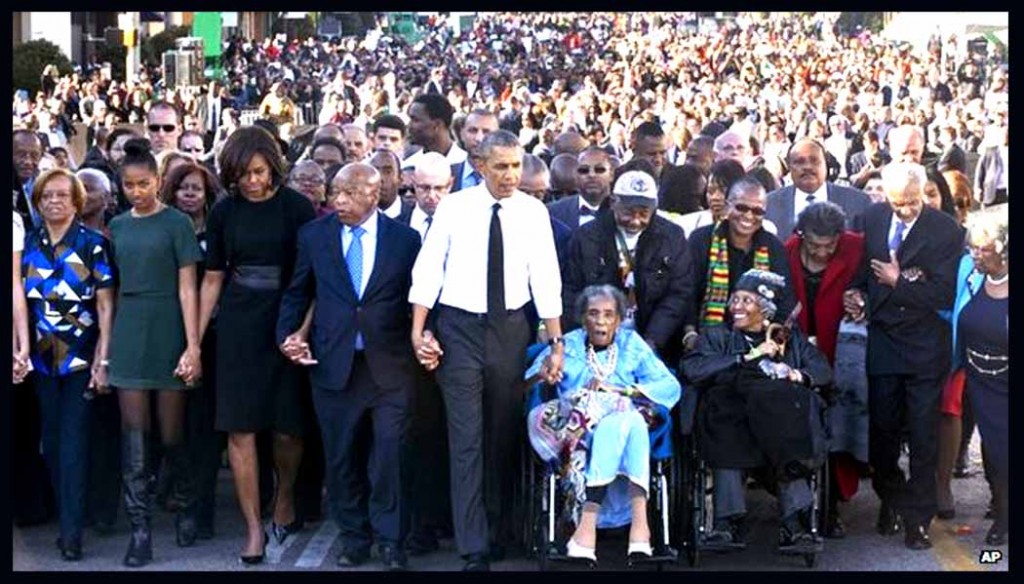 President Barack Obama’s Speech
President Barack Obama’s Speech
They did as Scripture instructed: “Rejoice in hope, be patient in tribulation, be constant in prayer.” And in the days to come, they went back again and again. When the trumpet call sounded for more to join, the people came – black and white, young and old, Christian and Jew, waving the American flag and singing the same anthems full of faith and hope. A white newsman, Bill Plante, who covered the marches then and who is with us here today, quipped that the growing number of white people lowered the quality of the singing. To those who marched, though, those old gospel songs must have never sounded so sweet.
In time, their chorus would reach President Johnson. And he would send them protection, echoing their call for the nation and the world to hear:
“We shall overcome.”
What enormous faith these men and women had. Faith in God – but also faith in America.
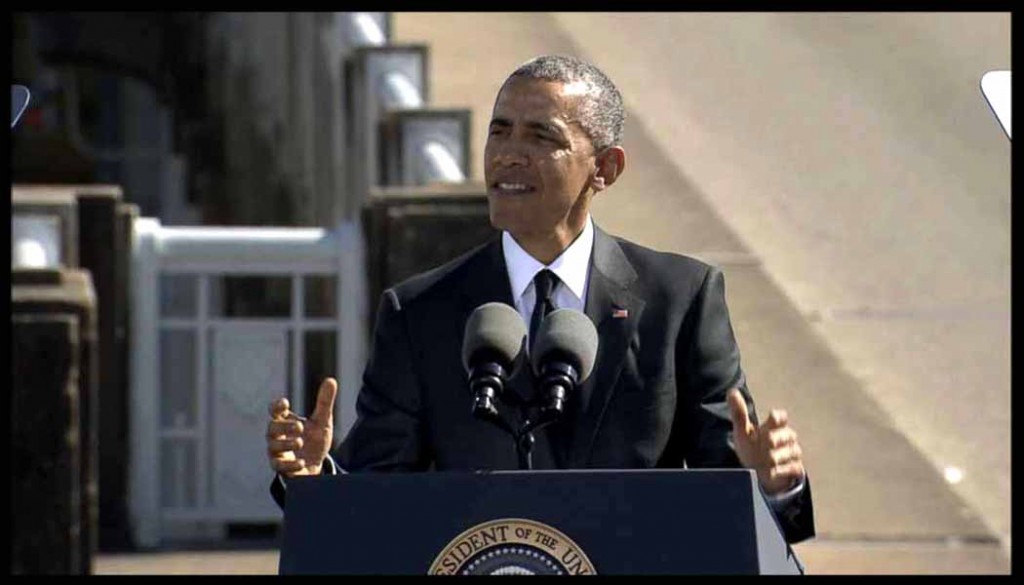
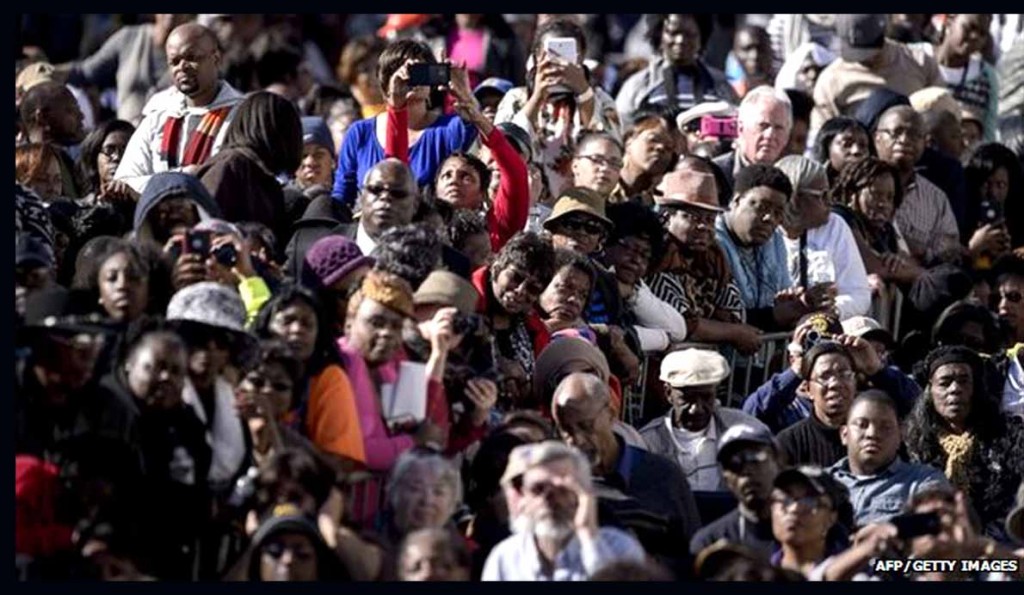 Some 40,000 people came to watch the president speak at the foot of the Edmund Pettus bridge
Some 40,000 people came to watch the president speak at the foot of the Edmund Pettus bridge
President Barack Obama’s Speech
The Americans who crossed this bridge were not physically imposing. But they gave courage to millions. They held no elected office. But they led a nation. They marched as Americans who had endured hundreds of years of brutal violence, and countless daily indignities – but they didn’t seek special treatment, just the equal treatment promised to them almost a century before.
What they did here will reverberate through the ages. Not because the change they won was preordained; not because their victory was complete; but because they proved that nonviolent change is possible; that love and hope can conquer hate.
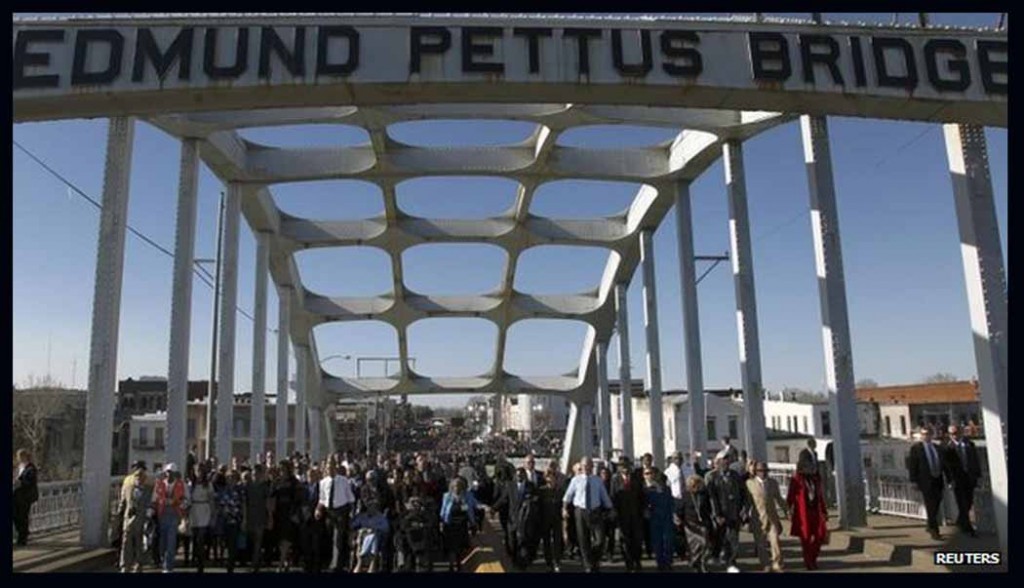 President Barack Obama led a crowd onto the bridge to mark the 50th anniversary of the civil rights march
President Barack Obama led a crowd onto the bridge to mark the 50th anniversary of the civil rights march
President Barack Obama’s Speech
As we commemorate their achievement, we are well-served to remember that at the time of the marches, many in power condemned rather than praised them. Back then, they were called Communists, half-breeds, outside agitators, sexual and moral degenerates, and worse – everything but the name their parents gave them. Their faith was questioned. Their lives were threatened. Their patriotism was challenged.
And yet, what could be more American than what happened in this place?
What could more profoundly vindicate the idea of America than plain and humble people – the unsung, the downtrodden, the dreamers not of high station, not born to wealth or privilege, not of one religious tradition but many – coming together to shape their country’s course?
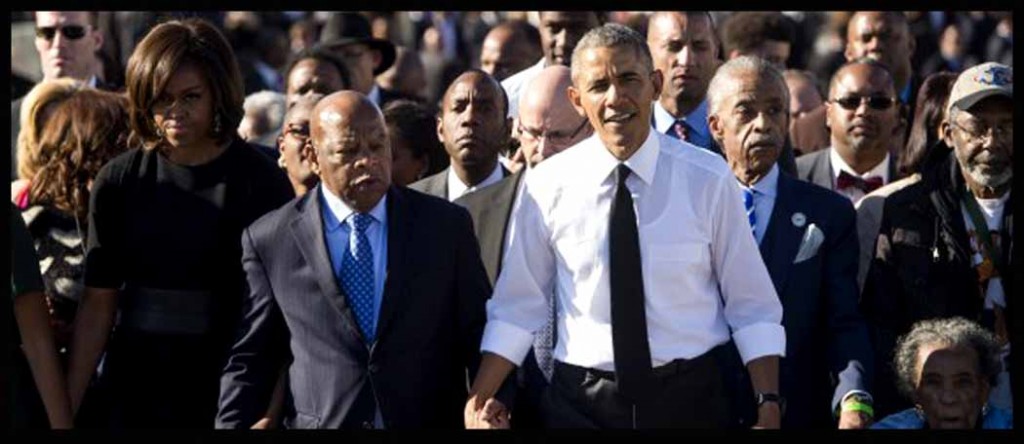 President Barack Obama’s Speech
President Barack Obama’s Speech
What greater expression of faith in the American experiment than this; what greater form of patriotism is there; than the belief that America is not yet finished, that we are strong enough to be self-critical, that each successive generation can look upon our imperfections and decide that it is in our power to remake this nation to more closely align with our highest ideals?
That’s why Selma is not some outlier in the American experience. That’s why it’s not a museum or static monument to behold from a distance. It is instead the manifestation of a creed written into our founding documents:
“We the People…in order to form a more perfect union.”
“We hold these truths to be self-evident, that all men are created equal.”
These are not just words. They are a living thing, a call to action, a roadmap for citizenship and an insistence in the capacity of free men and women to shape our own destiny. For founders like Franklin and Jefferson, for leaders like Lincoln and FDR, the success of our experiment in self-government rested on engaging all our citizens in this work. That’s what we celebrate here in Selma. That’s what this movement was all about, one leg in our long journey toward freedom.
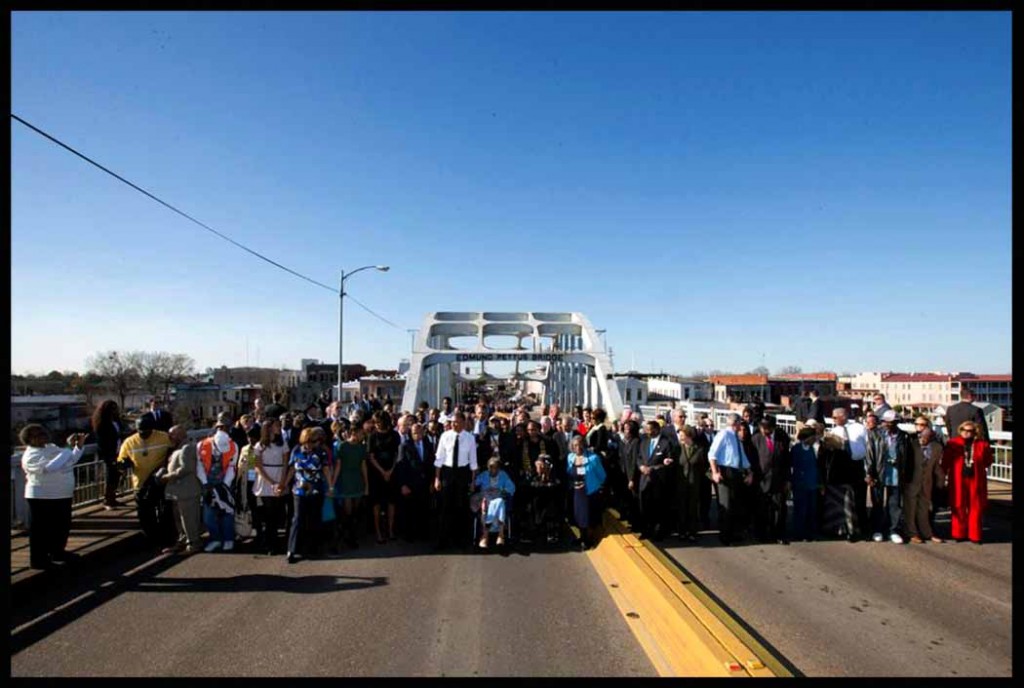 President Barack Obama’s Speech
President Barack Obama’s Speech
The American instinct that led these young men and women to pick up the torch and cross this bridge is the same instinct that moved patriots to choose revolution over tyranny. It’s the same instinct that drew immigrants from across oceans and the Rio Grande; the same instinct that led women to reach for the ballot and workers to organize against an unjust status quo; the same instinct that led us to plant a flag at Iwo Jima and on the surface of the Moon.
It’s the idea held by generations of citizens who believed that America is a constant work in progress; who believed that loving this country requires more than singing its praises or avoiding uncomfortable truths. It requires the occasional disruption, the willingness to speak out for what’s right and shake up the status quo.
That’s what makes us unique, and cements our reputation as a beacon of opportunity. Young people behind the Iron Curtain would see Selma and eventually tear down a wall. Young people in Soweto would hear Bobby Kennedy talk about ripples of hope and eventually banish the scourge of apartheid. Young people in Burma went to prison rather than submit to military rule. From the streets of Tunis to the Maidan in Ukraine, this generation of young people can draw strength from this place, where the powerless could change the world’s greatest superpower, and push their leaders to expand the boundaries of freedom.
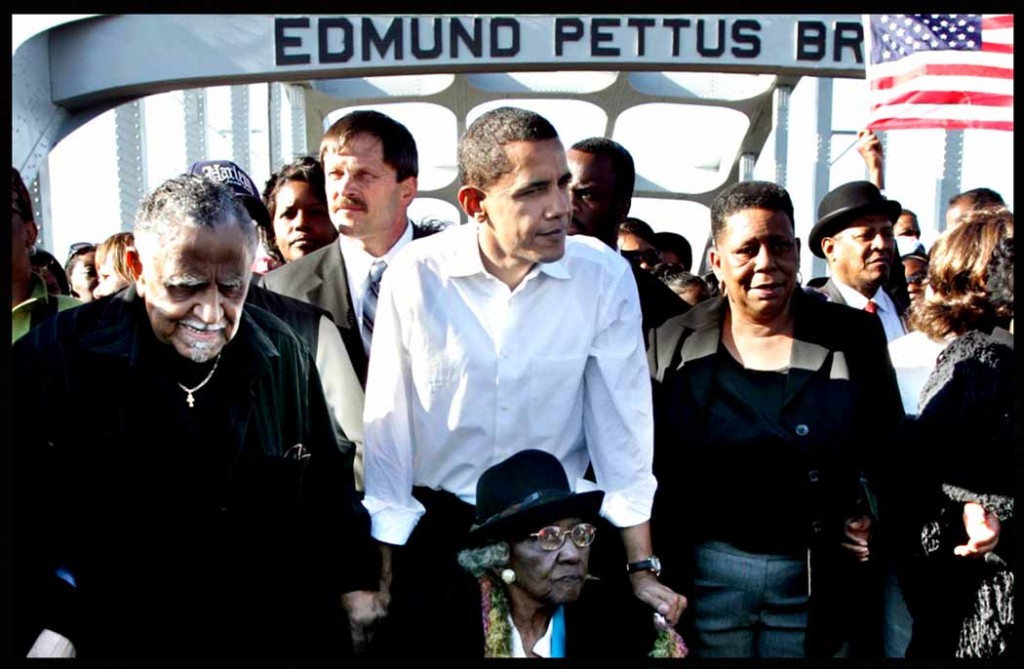 President Barack Obama’s Speech
President Barack Obama’s Speech
They saw that idea made real in Selma, Alabama. They saw it made real in America.
Because of campaigns like this, a Voting Rights Act was passed. Political, economic, and social barriers came down, and the change these men and women wrought is visible here today in the presence of African-Americans who run boardrooms, who sit on the bench, who serve in elected office from small towns to big cities; from the Congressional Black Caucus to the Oval Office.
Because of what they did, the doors of opportunity swung open not just for African-Americans, but for every American. Women marched through those doors. Latinos marched through those doors. Asian-Americans, gay Americans, and Americans with disabilities came through those doors. Their endeavors gave the entire South the chance to rise again, not by reasserting the past, but by transcending the past.
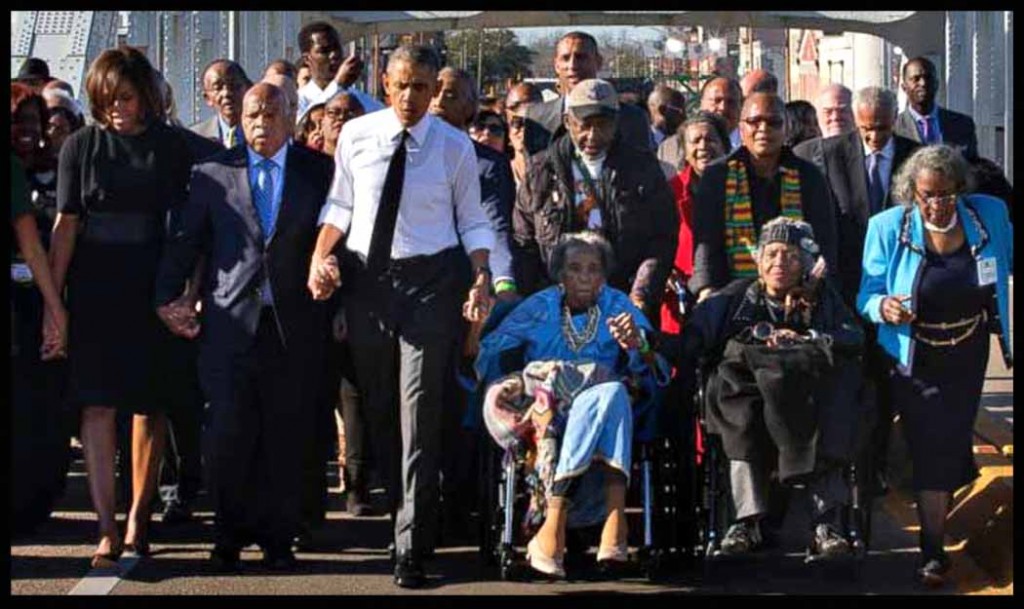 President Barack Obama’s Speech
President Barack Obama’s Speech
What a glorious thing, Dr. King might say.
What a solemn debt we owe.
Which leads us to ask, just how might we repay that debt?
First and foremost, we have to recognize that one day’s commemoration, no matter how special, is not enough. If Selma taught us anything, it’s that our work is never done – the American experiment in self-government gives work and purpose to each generation.
Selma teaches us, too, that action requires that we shed our cynicism. For when it comes to the pursuit of justice, we can afford neither complacency nor despair.
Just this week, I was asked whether I thought the Department of Justice’s Ferguson report shows that, with respect to race, little has changed in this country. I understand the question, for the report’s narrative was woefully familiar. It evoked the kind of abuse and disregard for citizens that spawned the Civil Rights Movement. But I rejected the notion that nothing’s changed. What happened in Ferguson may not be unique, but it’s no longer endemic, or sanctioned by law and custom; and before the Civil Rights Movement, it most surely was.
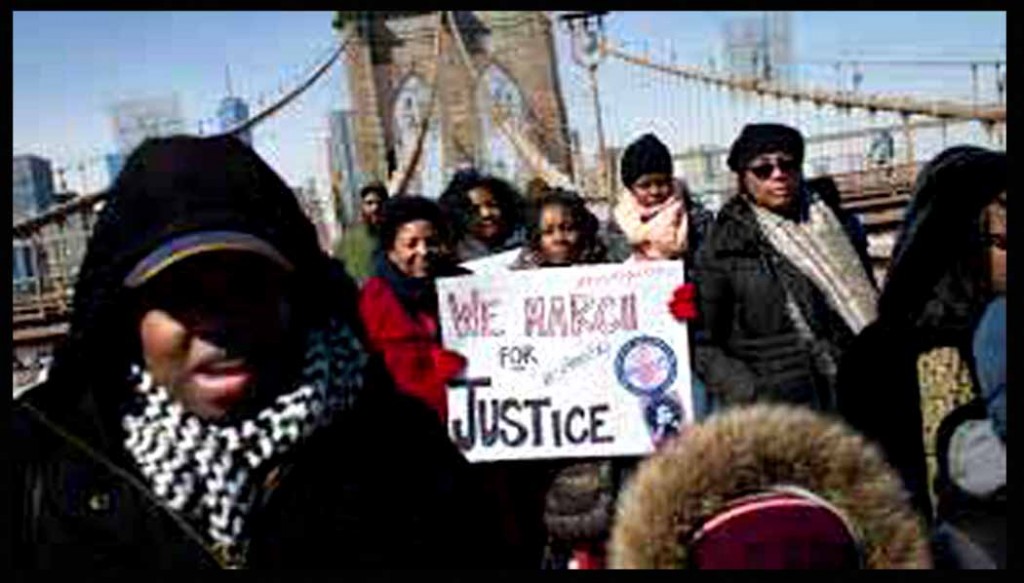 President Barack Obama’s Speech
President Barack Obama’s Speech
We do a disservice to the cause of justice by intimating that bias and discrimination are immutable, or that racial division is inherent to America. If you think nothing’s changed in the past fifty years, ask somebody who lived through the Selma or Chicago or L.A. of the Fifties. Ask the female CEO who once might have been assigned to the secretarial pool if nothing’s changed. Ask your gay friend if it’s easier to be out and proud in America now than it was thirty years ago. To deny this progress – our progress – would be to rob us of our own agency; our responsibility to do what we can to make America better.
Of course, a more common mistake is to suggest that racism is banished, that the work that drew men and women to Selma is complete, and that whatever racial tensions remain are a consequence of those seeking to play the “race card” for their own purposes. We don’t need the Ferguson report to know that’s not true. We just need to open our eyes, and ears, and hearts, to know that this nation’s racial history still casts its long shadow upon us. We know the march is not yet over, the race is not yet won, and that reaching that blessed destination where we are judged by the content of our character – requires admitting as much.
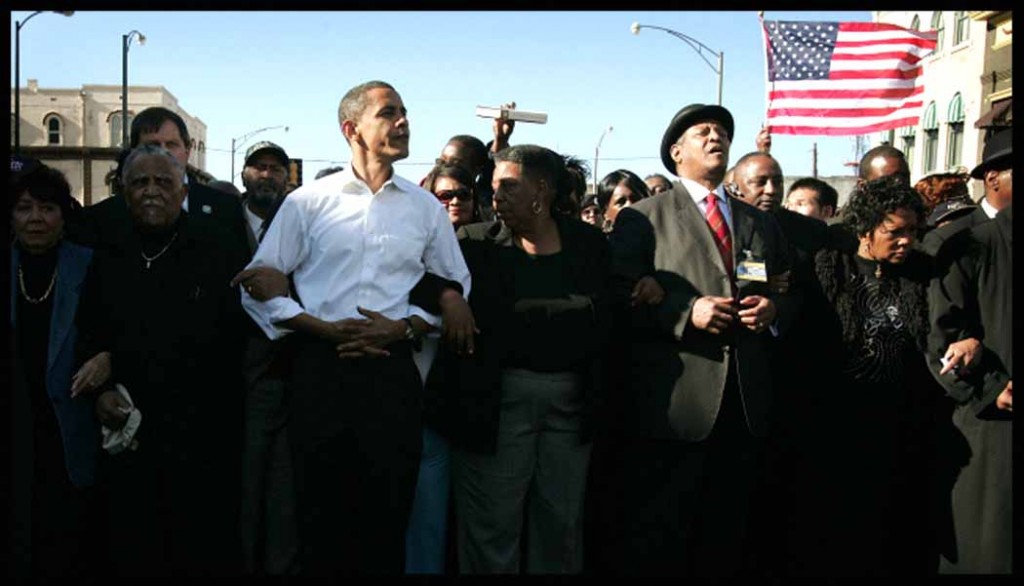 President Barack Obama’s Speech
President Barack Obama’s Speech
“We are capable of bearing a great burden,” James Baldwin wrote, “once we discover that the burden is reality and arrive where reality is.”
This is work for all Americans, and not just some. Not just whites. Not just blacks. If we want to honor the courage of those who marched that day, then all of us are called to possess their moral imagination. All of us will need to feel, as they did, the fierce urgency of now. All of us need to recognize, as they did, that change depends on our actions, our attitudes, the things we teach our children. And if we make such effort, no matter how hard it may seem, laws can be passed, and consciences can be stirred, and consensus can be built.
With such effort, we can make sure our criminal justice system serves all and not just some. Together, we can raise the level of mutual trust that policing is built on – the idea that police officers are members of the communities they risk their lives to protect, and citizens in Ferguson and New York and Cleveland just want the same thing young people here marched for – the protection of the law. Together, we can address unfair sentencing, and overcrowded prisons, and the stunted circumstances that rob too many boys of the chance to become men, and rob the nation of too many men who could be good dads, and workers, and neighbors.
With effort, we can roll back poverty and the roadblocks to opportunity. Americans don’t accept a free ride for anyone, nor do we believe in equality of outcomes. But we do expect equal opportunity, and if we really mean it, if we’re willing to sacrifice for it, then we can make sure every child gets an education suitable to this new century, one that expands imaginations and lifts their sights and gives them skills. We can make sure every person willing to work has the dignity of a job, and a fair wage, and a real voice, and sturdier rungs on that ladder into the middle class.
And with effort, we can protect the foundation stone of our democracy for which so many marched across this bridge – and that is the right to vote. Right now, in 2015, fifty years after Selma, there are laws across this country designed to make it harder for people to vote. As we speak, more of such laws are being proposed. Meanwhile, the Voting Rights Act, the culmination of so much blood and sweat and tears, the product of so much sacrifice in the face of wanton violence, stands weakened, its future subject to partisan rancor.
President Barack Obama’s Speech
How can that be? The Voting Rights Act was one of the crowning achievements of our democracy, the result of Republican and Democratic effort. President Reagan signed its renewal when he was in office. President Bush signed its renewal when he was in office. One hundred Members of Congress have come here today to honor people who were willing to die for the right it protects. If we want to honor this day, let these hundred go back to Washington, and gather four hundred more, and together, pledge to make it their mission to restore the law this year.
Of course, our democracy is not the task of Congress alone, or the courts alone, or the President alone. If every new voter suppression law was struck down today, we’d still have one of the lowest voting rates among free peoples. Fifty years ago, registering to vote here in Selma and much of the South meant guessing the number of jellybeans in a jar or bubbles on a bar of soap. It meant risking your dignity, and sometimes, your life. What is our excuse today for not voting? How do we so casually discard the right for which so many fought? How do we so fully give away our power, our voice, in shaping America’s future?
Fellow marchers, so much has changed in fifty years. We’ve endured war, and fashioned peace. We’ve seen technological wonders that touch every aspect of our lives, and take for granted convenience our parents might scarcely imagine. But what has not changed is the imperative of citizenship, that willingness of a 26 year-old deacon, or a Unitarian minister, or a young mother of five, to decide they loved this country so much that they’d risk everything to realize its promise.
That’s what it means to love America. That’s what it means to believe in America. That’s what it means when we say America is exceptional.
For we were born of change. We broke the old aristocracies, declaring ourselves entitled not by bloodline, but endowed by our Creator with certain unalienable rights. We secure our rights and responsibilities through a system of self-government, of and by and for the people. That’s why we argue and fight with so much passion and conviction, because we know our efforts matter. We know America is what we make of it.
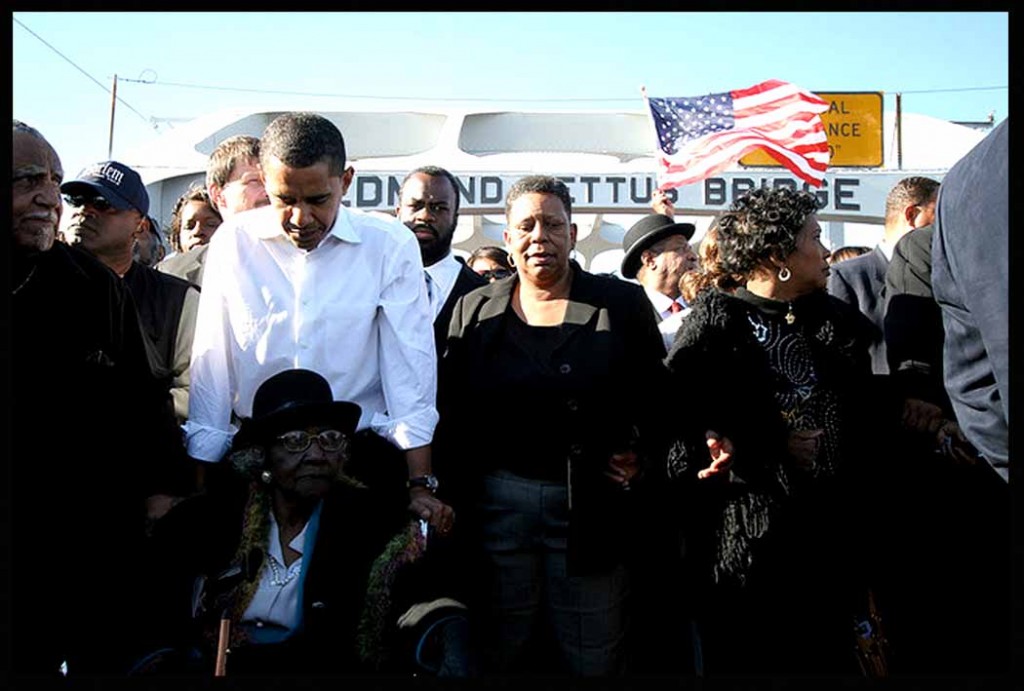 President Barack Obama’s Speech
President Barack Obama’s Speech
We are Lewis and Clark and Sacajawea – pioneers who braved the unfamiliar, followed by a stampede of farmers and miners, entrepreneurs and hucksters. That’s our spirit.
We are Sojourner Truth and Fannie Lou Hamer, women who could do as much as any man and then some; and we’re Susan B. Anthony, who shook the system until the law reflected that truth. That’s our character.
We’re the immigrants who stowed away on ships to reach these shores, the huddled masses yearning to breathe free – Holocaust survivors, Soviet defectors, the Lost Boys of Sudan. We are the hopeful strivers who cross the Rio Grande because they want their kids to know a better life. That’s how we came to be.
We’re the slaves who built the White House and the economy of the South. We’re the ranch hands and cowboys who opened the West, and countless laborers who laid rail, and raised skyscrapers, and organized for workers’ rights.
We’re the fresh-faced GIs who fought to liberate a continent, and we’re the Tuskeegee Airmen, Navajo code-talkers, and Japanese-Americans who fought for this country even as their own liberty had been denied. We’re the firefighters who rushed into those buildings on 9/11, and the volunteers who signed up to fight in Afghanistan and Iraq.
We are the gay Americans whose blood ran on the streets of San Francisco and New York, just as blood ran down this bridge.
We are storytellers, writers, poets, and artists who abhor unfairness, and despise hypocrisy, and give voice to the voiceless, and tell truths that need to be told.
We are the inventors of gospel and jazz and the blues, bluegrass and country, hip-hop and rock and roll, our very own sounds with all the sweet sorrow and reckless joy of freedom.
We are Jackie Robinson, enduring scorn and spiked cleats and pitches coming straight to his head, and stealing home in the World Series anyway.
We are the people Langston Hughes wrote of, who “build our temples for tomorrow, strong as we know how.”
We are the people Emerson wrote of, “who for truth and honor’s sake stand fast and suffer long;” who are “never tired, so long as we can see far enough.”
That’s what America is. Not stock photos or airbrushed history or feeble attempts to define some of us as more American as others. We respect the past, but we don’t pine for it. We don’t fear the future; we grab for it. America is not some fragile thing; we are large, in the words of Whitman, containing multitudes. We are boisterous and diverse and full of energy, perpetually young in spirit. That’s why someone like John Lewis at the ripe age of 25 could lead a mighty march.
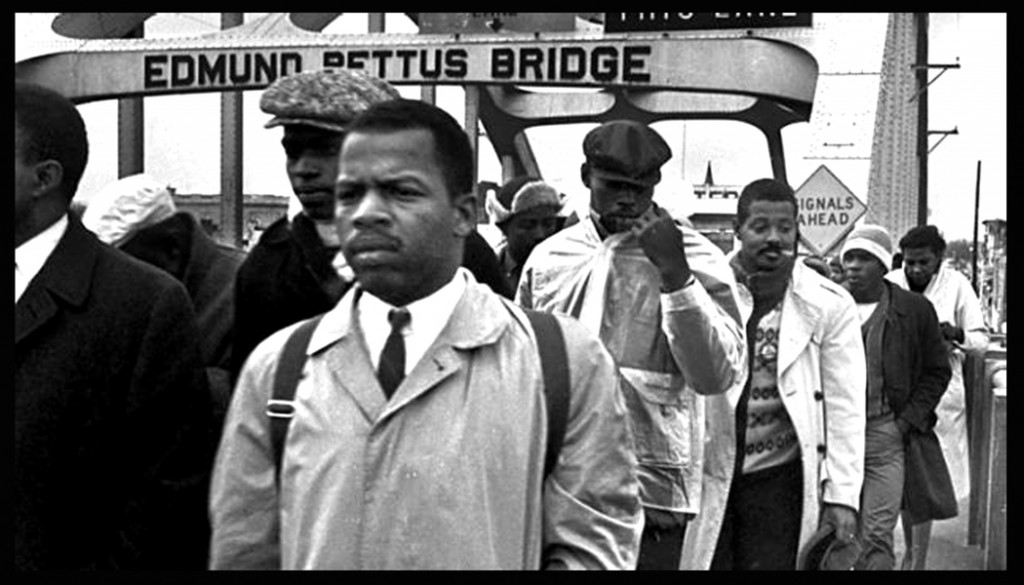 John Lewis fifty years ago at The Selma civil rights march in Alabama on March 7, 1965, when security forces attacked black demonstrators, called “Bloody Sunday”.
John Lewis fifty years ago at The Selma civil rights march in Alabama on March 7, 1965, when security forces attacked black demonstrators, called “Bloody Sunday”.
President Barack Obama’s Speech
And that’s what the young people here today and listening all across the country must take away from this day. You are America. Unconstrained by habits and convention. Unencumbered by what is, and ready to seize what ought to be. For everywhere in this country, there are first steps to be taken, and new ground to cover, and bridges to be crossed. And it is you, the young and fearless at heart, the most diverse and educated generation in our history, who the nation is waiting to follow.
Because Selma shows us that America is not the project of any one person.
Because the single most powerful word in our democracy is the word “We.” We The People. We Shall Overcome. Yes We Can. It is owned by no one. It belongs to everyone. Oh, what a glorious task we are given, to continually try to improve this great nation of ours.
Fifty years from Bloody Sunday, our march is not yet finished. But we are getting closer. Two hundred and thirty-nine years after this nation’s founding, our union is not yet perfect. But we are getting closer. Our job’s easier because somebody already got us through that first mile. Somebody already got us over that bridge. When it feels the road’s too hard, when the torch we’ve been passed feels too heavy, we will remember these early travelers, and draw strength from their example, and hold firmly the words of the prophet Isaiah:
“Those who hope in the Lord will renew their strength. They will soar on wings like eagles. They will run and not grow weary. They will walk and not be faint.”
We honor those who walked so we could run. We must run so our children soar. And we will not grow weary. For we believe in the power of an awesome God, and we believe in this country’s sacred promise.
May He bless those warriors of justice no longer with us, and bless the United States of America.
For more information please visit the following link:
https://time.com/3736357/barack-obama-selma-speech-transcript/
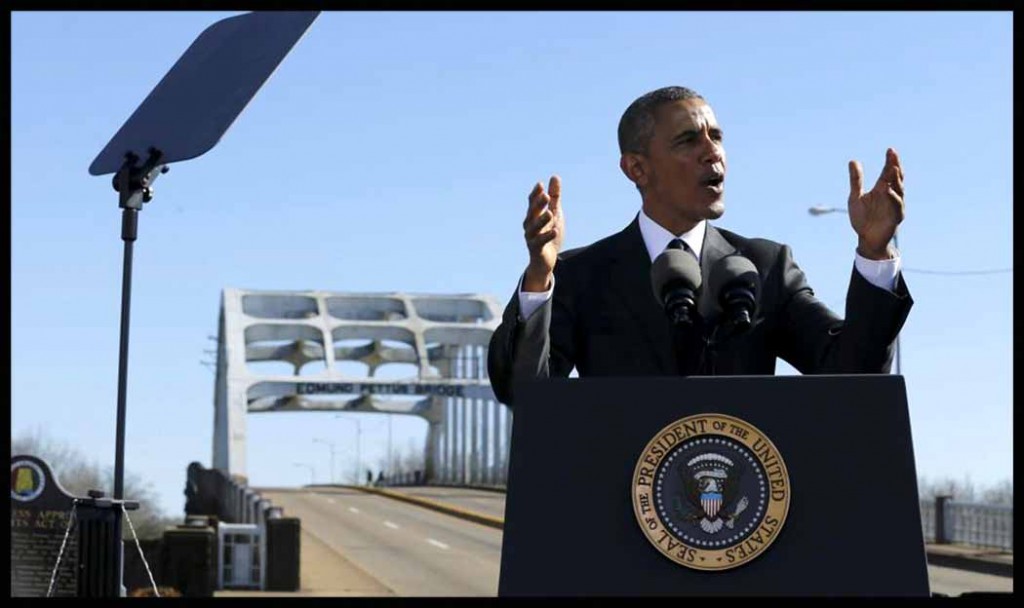
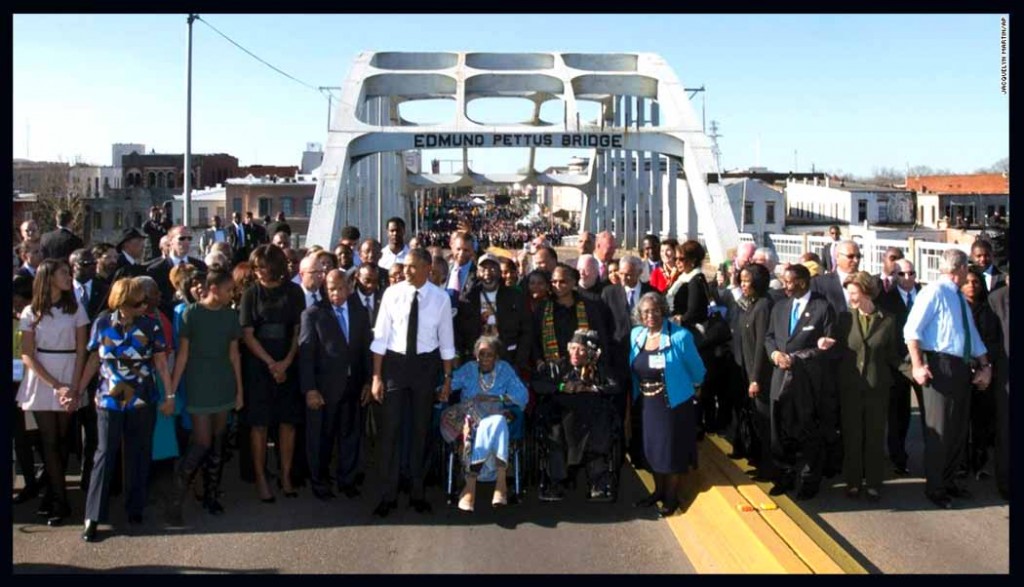
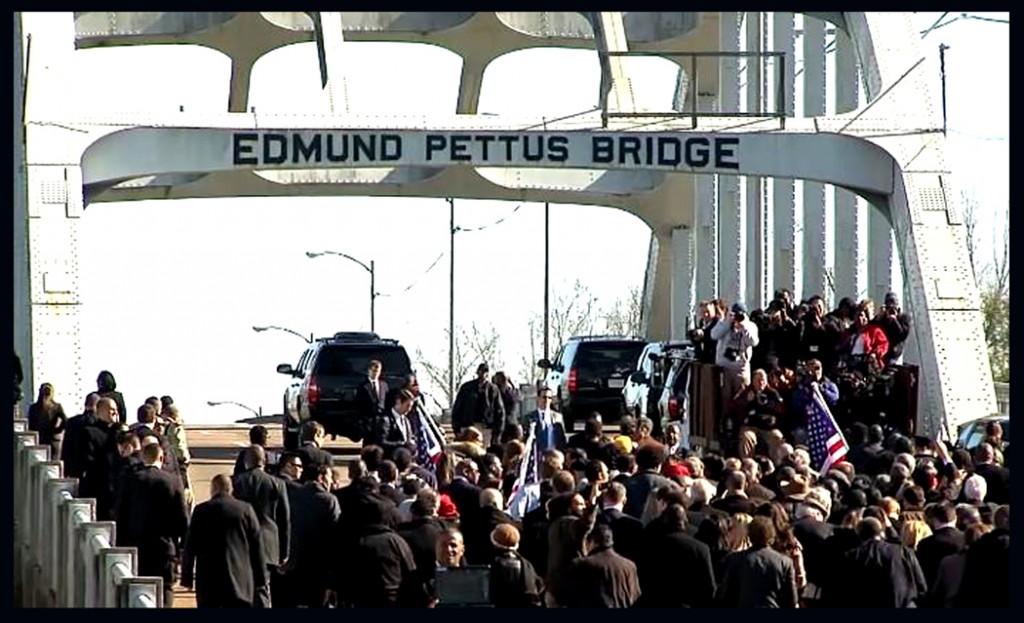
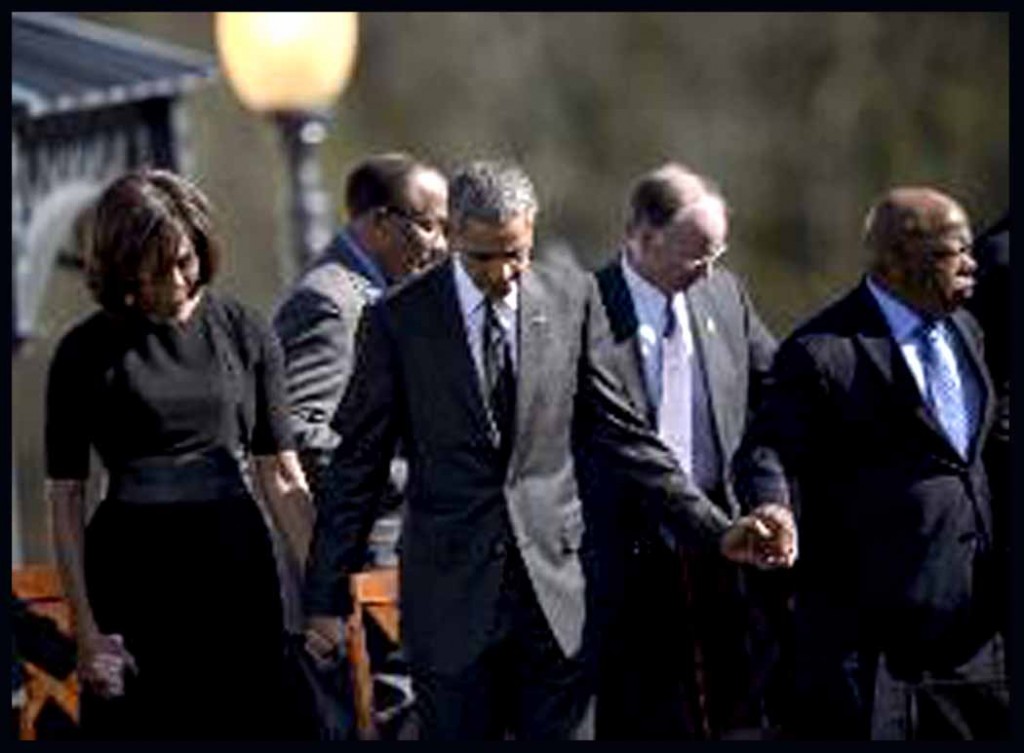
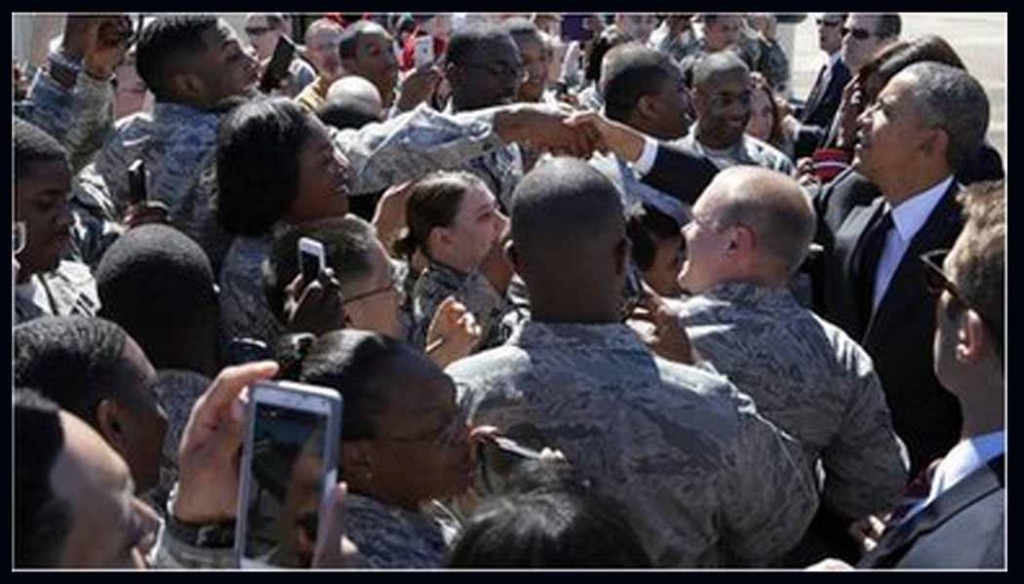
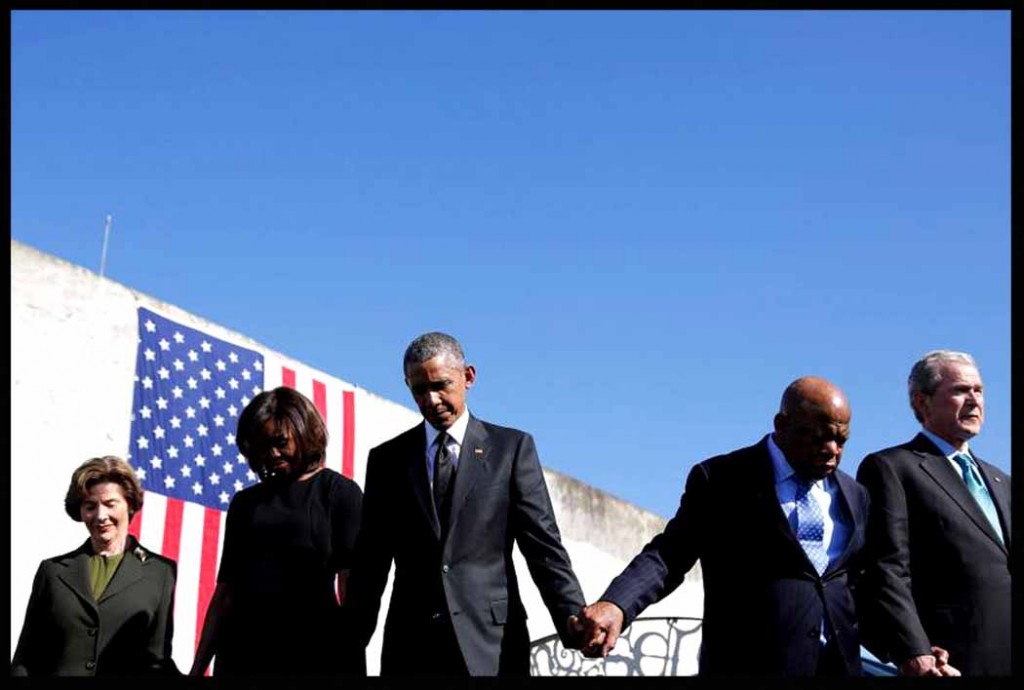

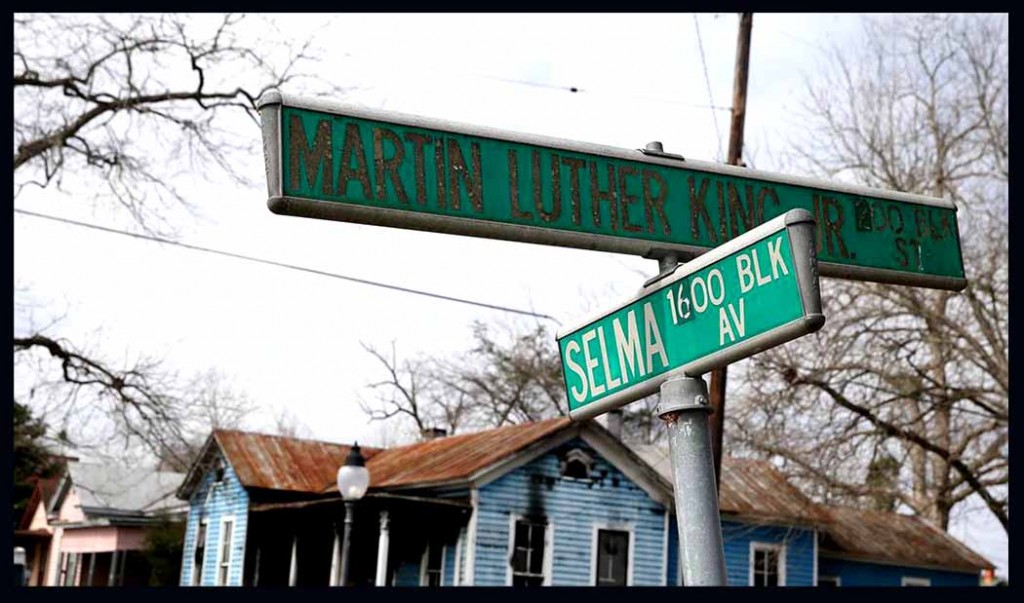 Most of the media applauded President Barack Obama’s speech, which rings all over the land on radio and television in the households of families. I hope it rings in the jails where the majority of inmates are African American and many of them very young.
Most of the media applauded President Barack Obama’s speech, which rings all over the land on radio and television in the households of families. I hope it rings in the jails where the majority of inmates are African American and many of them very young.
I hope it rings in the poor neighborhoods of Newark, New Jersey, Chicago, Illinois, Detroit, Michigan, and other poor black and white communities. There is an almost 40% unemployment rate among AfricanAmerican youths. I wonder how many of these young people and their poor families will listen to President Barack Obama speech.
One part of President Obama speech states the following.
“Of course, our democracy is not the task of Congress alone, or the courts alone, or the President alone. If every new voter suppression law was struck down today, we’d still have one of the lowest voting rates among free peoples. Fifty years ago, registering to vote here in Selma and much of the South meant guessing the number of jellybeans in a jar or bubbles on a bar of soap. It meant risking your dignity, and sometimes, your life. What is our excuse today for not voting? How do we so casually discard the right for which so many fought? How do we so fully give away our power, our voice, in shaping America’s future?”
Do we think the unemployed poor and their families will worry about going to vote for their rights? Their priority is to find money in any way they can for their food and other expenses for survival.
The government and most of the politicians outside of government are only concerned about the middle class therefore they are not going to get the votes of the poor Besides lacking money, the poor also lack education not in the traditional form of a university degree but in the education of common sense. How can we get politicians to listen to the voice of the poor, not only the middle class? How can we make them announce in their campaigned advertisements or any speeches that they are going to fight for the rights of the poor. I never hear politicians announce in their campaigned that they want to help the poor. I only hear that they are going to help the middle class. The poor citizens are left to rot in their own neighborhoods only use the police to patrol the parameter in order to prevent them from coming out cause trouble for the rich and the middle class.
When the pressures inside the poor are so great they are going to explode and it will burst out all over the country. Groups of poor people will grow bigger and bigger and eventually will be a majority of the population of the country. I only hope that it will not be like the French revolution that used the Galantine to chop off heads of Royalty and the bourgeoisie.
It is so sad that a group of congress members cut down the food stamp budget but kept the farm subsidize budget for rich families and themselves to profit. According to records, a lot of poor children rely on food stamps for their daily food consumption. If this group of congress members does not feel sympathy toward poor adults, should they at least be concerned about children? Maybe they lack concern because the children cannot vote and they have no voice. These congress members cut the food stamp budget that helps the poor by millions but promote war which will cost billions or even trillions.
Some people abuse the poor by taking their money to gain revenue such as administrators of the city of Ferguson. The poor have hard time earning money to buy food and pay rent for living quarters for themselves, their children, and family, but they still get abused by authority and the rich, who do so without shame. Where is their integrity?
If the poor ask for mercy from authority, such as the Supreme Court, but the five member majority of the Supreme Court say that corporations are people too. Do you think that the corporations that have budgets in billions and can donate money in millions to politicians of their preference are the same as the poor who need food stamps for their children? Do you think that corporations are the same as the 40% of unemployed black youths?
In general groups of the same ethnicity tend to support each other because they understand each other and have similar experiences. Supreme Court Justice Clearance Thomas used the Affirmative Action policy when he studied at Yale Law School. Now he is in the highest position of the land and his decisions will make differences to help the poor and minorities. But he says that the US does not need an Affirmative Action Policy, because there are no longer problems of racism in America.. I wish he had studied the reports from Attorney General Eric Holder about how the city of Ferguson abused the poor, especially black citizens. The city of Ferguson is only one small city. We do not know how many more cities practice the same policy.
We still need Affirmative Action and need to help the poor because society is still not equal. Yes, there are many who have tried to improve the situation. But some minority people are selfish and greedy. We need to convince these people not to be penny wise and pound foolish. Spending money to help the poor feed their children and families, pay for places to live and education for their children will eventually allow them to work for the rich and for corporations and will allow them to pay tax helping to increase the revenue for government expenses.
The rich and corporations need educated workers. If they do not help educate the poor how are they are going to get workers in America? We do not want poor children to starve. Uneducated children become desperate adults and we know what desperate people can do. It is not good to be rich without peace because there will be no peace if the majority of people are poor and desperate.
As we see all around the world many countries are fighting with each other for different reasons. Most of the fighting is between the minority rich and majority poor. There is no peace between these countries or within these counties.
The United States will try to learn and try to improve the situation for the country to be more fair and equal. One of the primary goals is to help the poor survive and become educated so they can see the validity of voting. Their votes will be meaningful and significant. They will be able to vote for politicians that are honest and want to serve all the people rather than politicians that serve only those that donate large sum of money for their own benefit.
Ing-On Vibulbhan-Watts, Friday, March 16, 2015
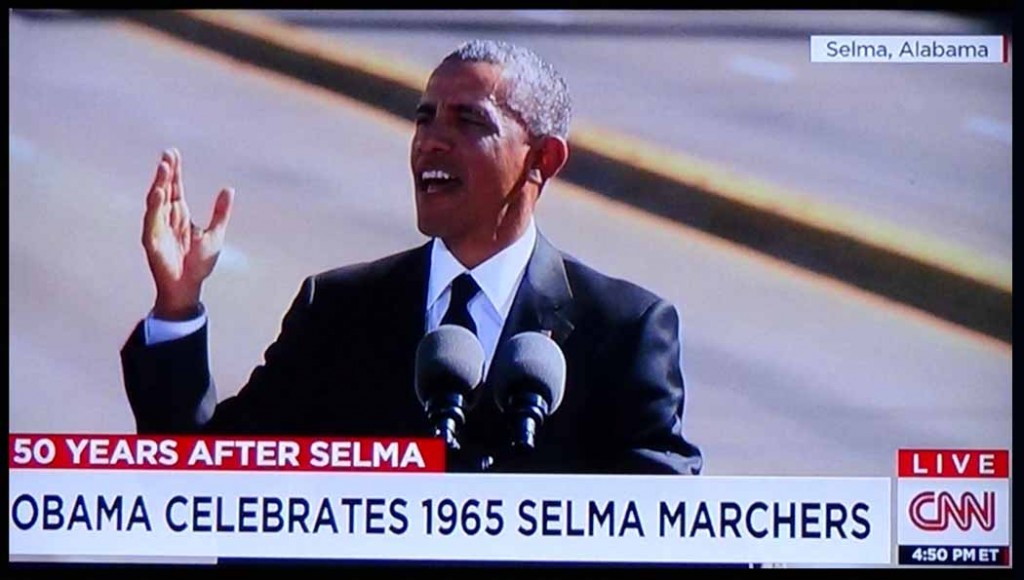
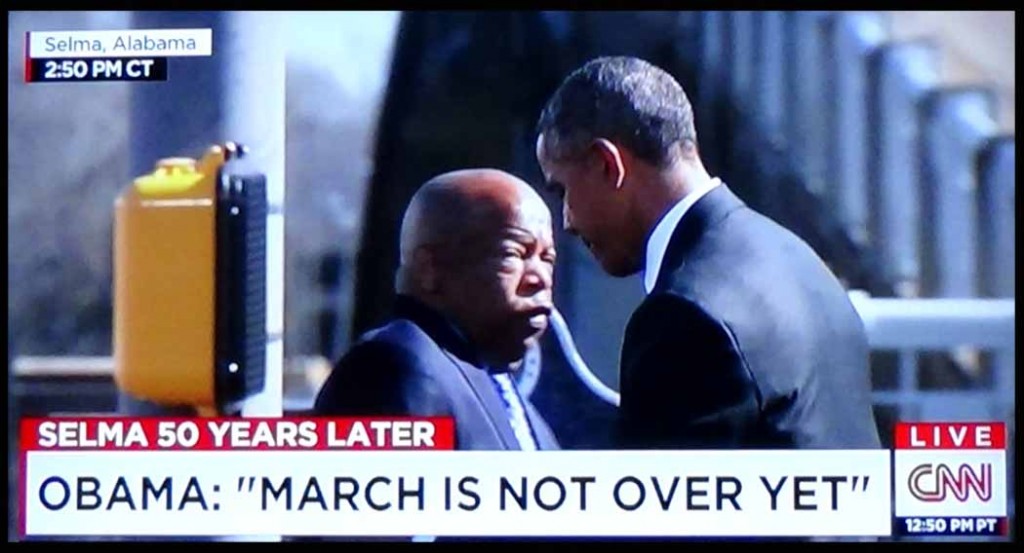
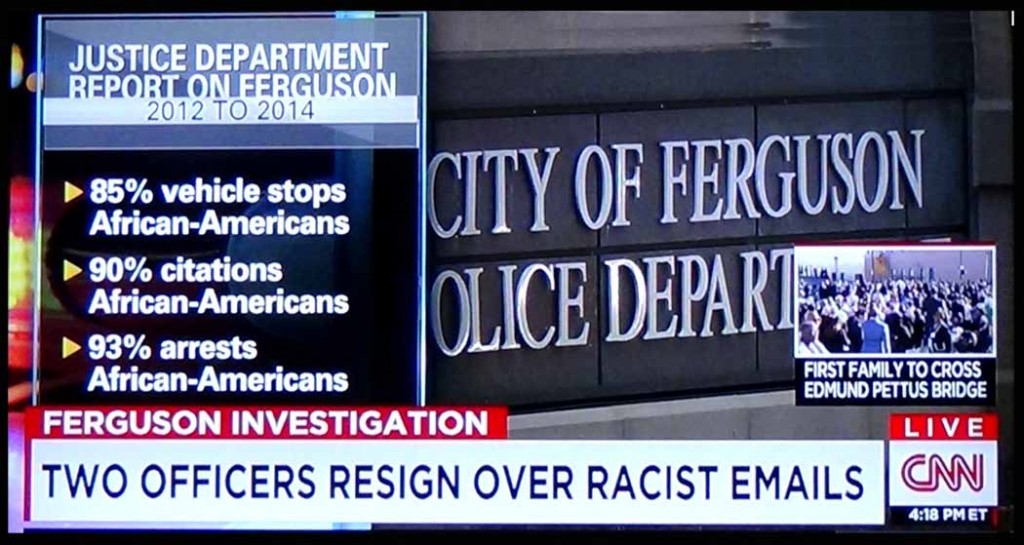
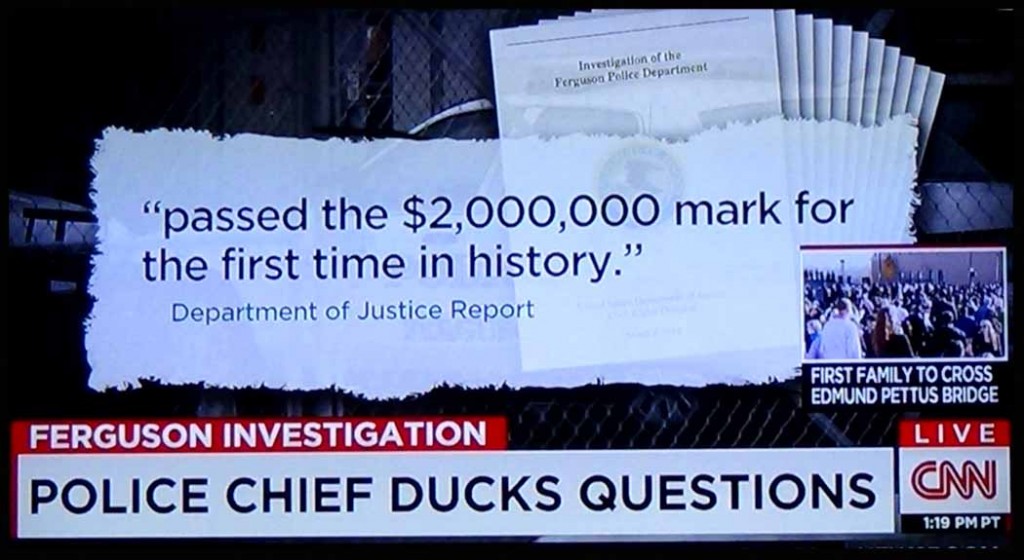
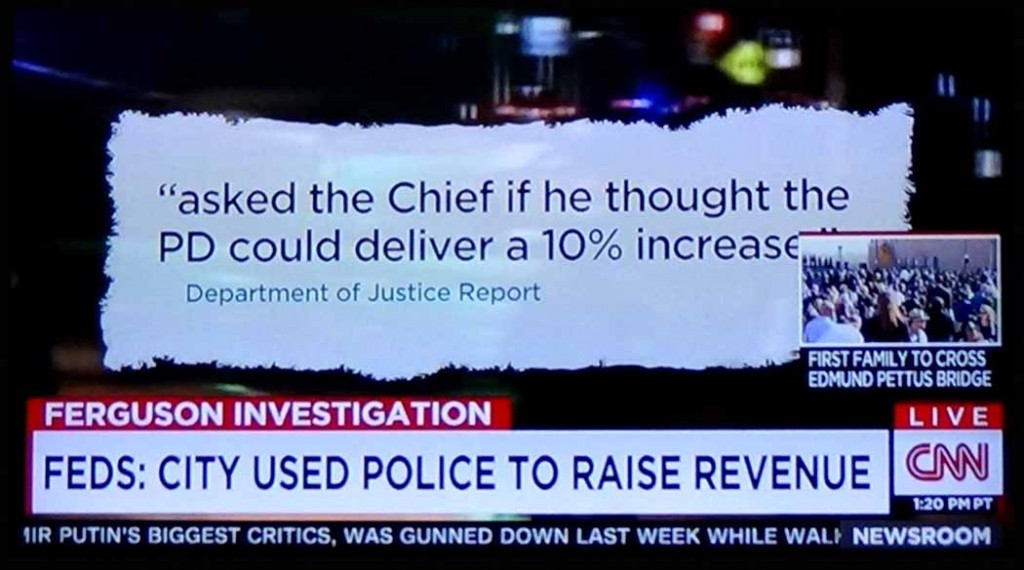
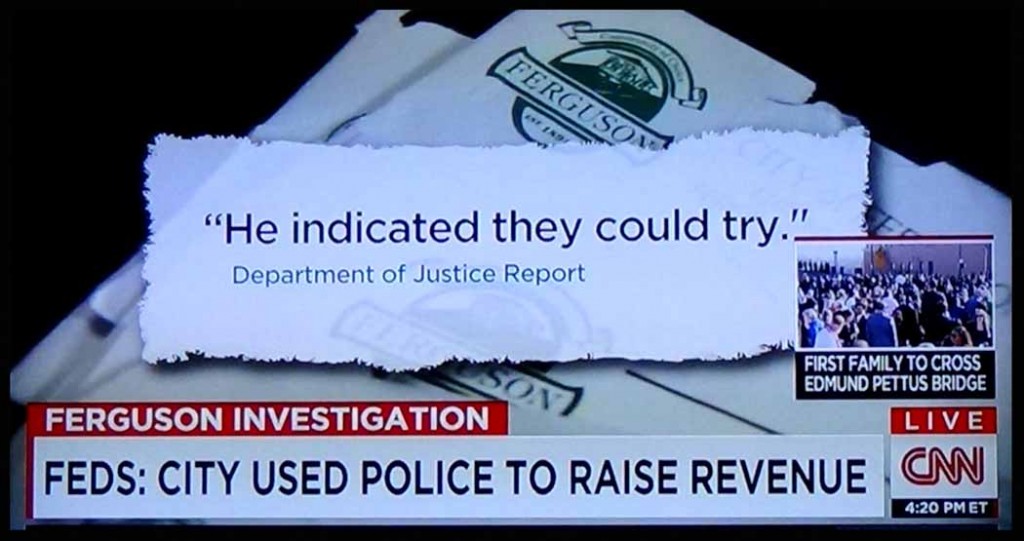
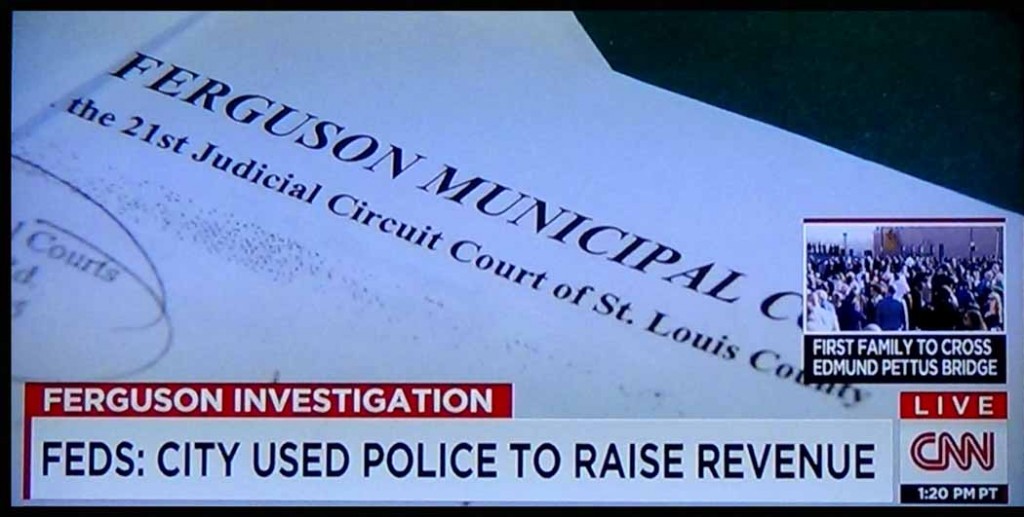
 For more information please visit the following links:
For more information please visit the following links:
President Barack Obama Praises Selma’s ExampleObama Cabinet: We Don’t Use Only Personal EmailBlack Teen Shot Dead by Wisconsin Cop Was Unarmed NBC News‘Our March Is Not Yet Finished,’ Obama Says in Selma NBC NewsRising Panda Numbers Are Tempered By a Virus NBC News
RACE AND ECONOMIC JUSTICE
WITH IMARA JONES
https://colorlines.com/archives/2014/01/youth_unemployment.html
The Crisis in Black and Brown Youth Unemployment
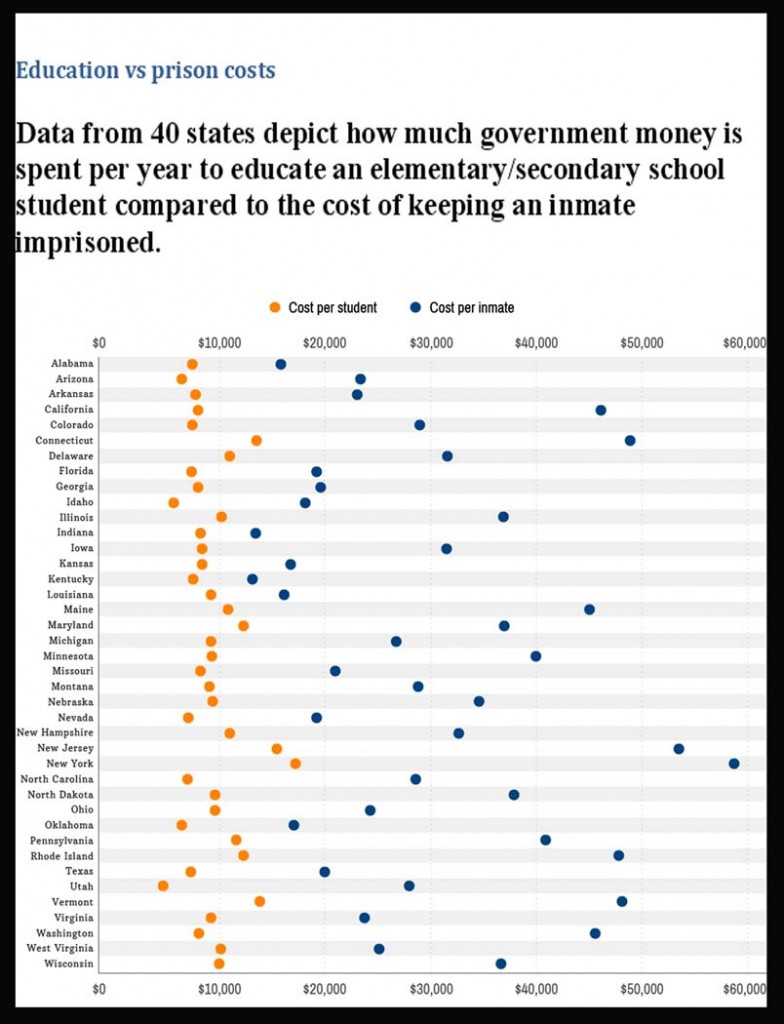 Source: U.S. Census Data and Vera Institute of Justice Graphic: Tal Yellin / CNNMoney
Source: U.S. Census Data and Vera Institute of Justice Graphic: Tal Yellin / CNNMoney
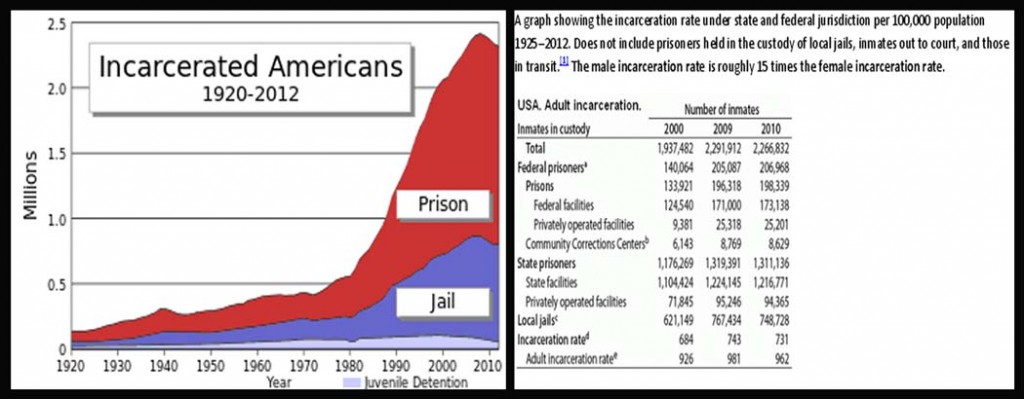 Total incarceration in the United States by year
Total incarceration in the United States by year
Right: Inmates held in custody in state or federal prisons or in local jails, December 31, 2000, and 2009–2010.[2]
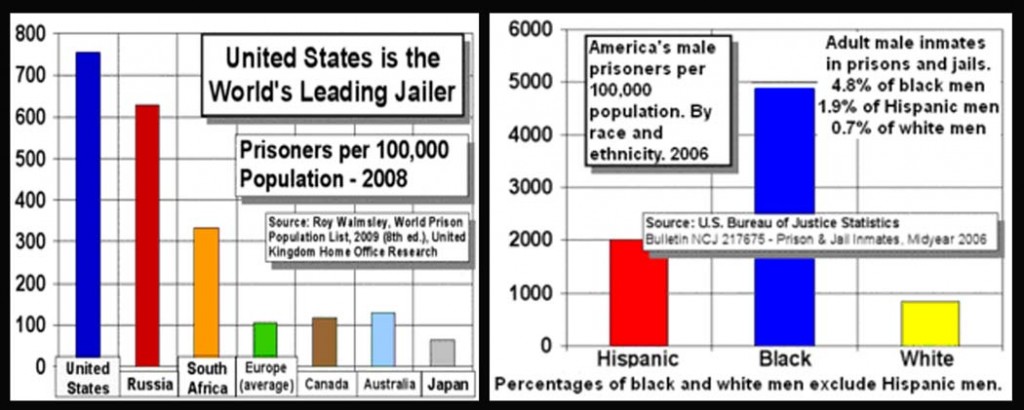
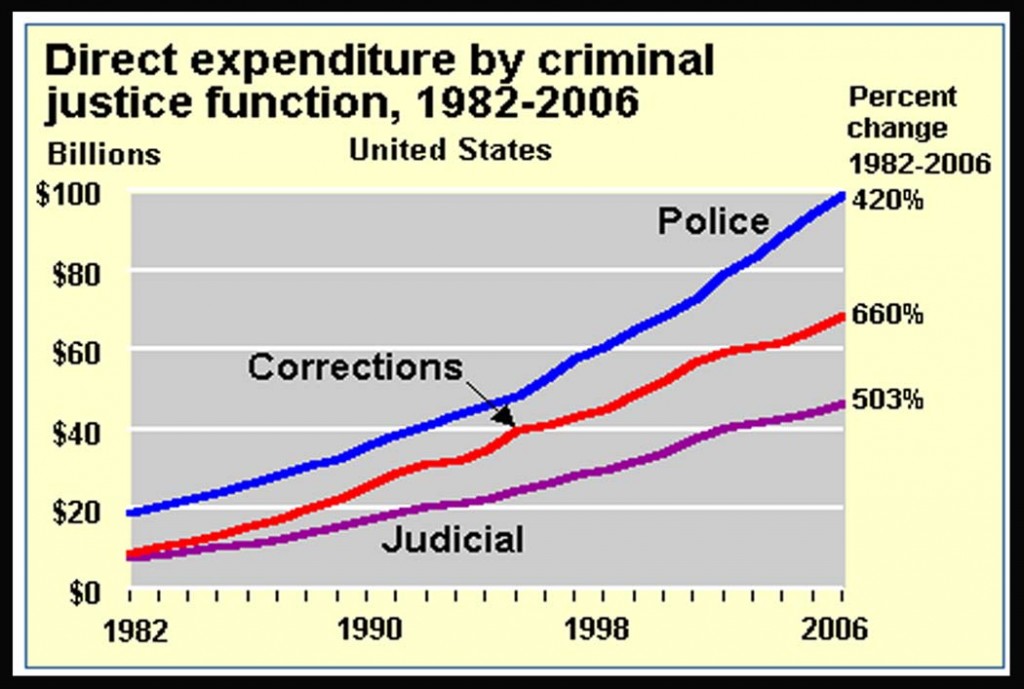 U.S. Bureau of Justice Statistics. Not adjusted for inflation. To view the inflation-adjusted data:[123]
U.S. Bureau of Justice Statistics. Not adjusted for inflation. To view the inflation-adjusted data:[123]
For more information please visit the following link: https://ingpeaceproject.com/2014/10/27/ings-peace-project-and-open-doors-party-at-the-newark-museum%E2%80%8F-part-3/
DOJ Finds Pattern of Racial Discrimination in Ferguson Police
- Ferguson Officials Suspended After DOJ Report Have Resigned, City Confirms
- Ferguson Police Employee Fired, Two Suspended for Racist Emails
- U.S. Finds Pattern of Biased Policing in Ferguson
- Ferguson Police Begin Testing ‘Less Lethal’ Gun Attachment
- Eric Holder Announces Justice Department Plan to Target Racial Profiling
Affirmative action
https://en.wikipedia.org/wiki/Affirmative_action
Clarence Thomas
https://en.wikipedia.org/wiki/Clarence_Thomas
In 2009’s Northwest Austin Municipal Utility District No. 1 v. Holder, Thomas was the sole dissenter, voting in favor of throwing out Section 5 of the 1965 Voting Rights Act. Section 5 requires states with a history of racial voter discrimination—mostly states from the old South—to get Justice Department clearance when revising election procedures. Though Congress had reauthorized Section 5 in 2006 for another 25 years, Thomas said the law was no longer necessary, pointing out that the rate of black voting in seven Section 5 states was higher than the national average. Thomas said “the violence, intimidation and subterfuge that led Congress to pass Section 5 and this court to uphold it no longer remains.”[130] He again took this position in Shelby County v. Holder, voting with the majority and concurring with the reasoning which struck down Section 5.[131]
Equal protection and affirmative action
Thomas believes that the Equal Protection Clause of the Fourteenth Amendment forbids consideration of race, such as race-based affirmative action or preferential treatment. In Adarand Constructors v. Peña, for example, he wrote “there is a ‘moral [and] constitutional equivalence’ between laws designed to subjugate a race and those that distribute benefits on the basis of race in order to foster some current notion of equality. Government cannot make us equal; it can only recognize, respect, and protect us as equal before the law. That [affirmative action] programs may have been motivated, in part, by good intentions cannot provide refuge from the principle that under our Constitution, the government may not make distinctions on the basis of race.”[150]
Among the nine justices, Thomas was the second most likely to uphold free speech claims (tied with David Souter), as of 2002.[132] He has voted in favor of First Amendment claims in cases involving a wide variety of issues, including pornography, campaign contributions, political leafleting, religious speech, and commercial speech.
On occasion, however, he has disagreed with free speech claimants. For example, he dissented in Virginia v. Black, a case that struck down part of a Virginia statute that banned cross burning. Concurring in Morse v. Frederick, he argued that students’ free speech rights in public schools are limited.[133]
How Clarence Thomas Grew To Hate Affirmative Action
https://www.businessinsider.com/how-clarence-thomas-grew-to-hate-affirmative-action-2013-10
Why Justice Clarence Thomas Stopped Being A Liberal
https://www.businessinsider.com/clarence-thomas-voted-for-mcgovern-2013-4
Why Clarence Thomas STILL Hasn’t Asked A Question In Seven Years
https://www.businessinsider.com/why-clarence-thomas-doesnt-ask-questions-2013-2
The Supreme Court Is On The Verge Of Letting States Rig Elections
https://www.businessinsider.com/supreme-court-killing-voting-rights-act-2013-2
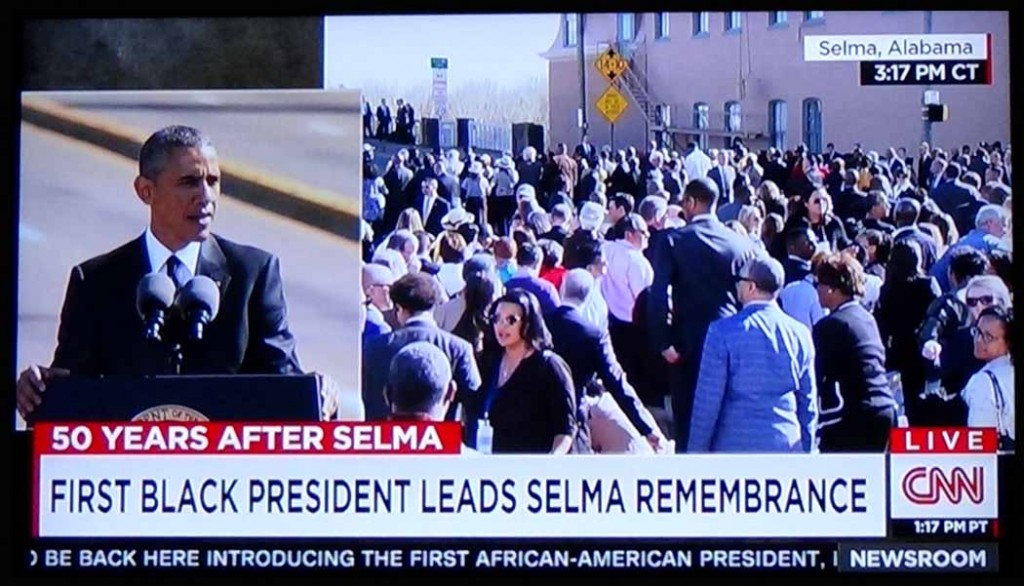
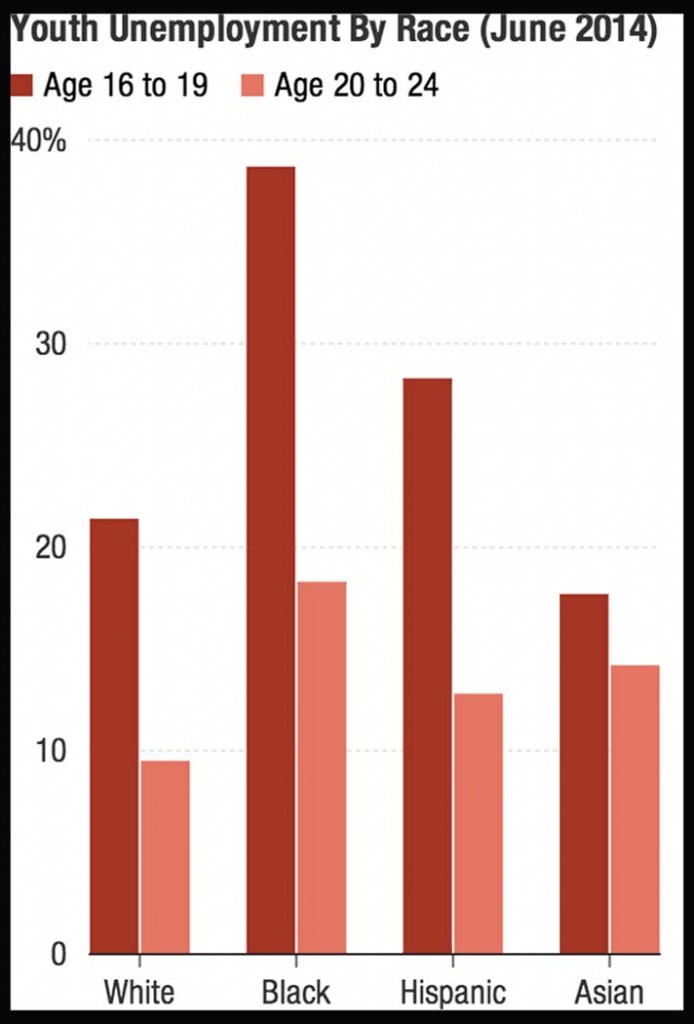
Leave a Reply